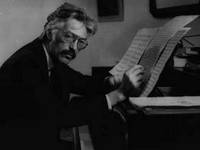
Aleksandar S. Vujić (1945, Senta) – composer, pianist, conductor, graduated in piano (1968), composition and conducting (1983) from the Belgrade Faculty of Music. He is the founder of the chamber orchestra Simfonietta Belgrade and the founder, art director and conductor of the Madrigal Choir of the Faculty of Music. He is Professor of the Faculty of Music in Belgrade and President of the Union of Serbian Homeland and Diaspora Choirs. His pieces were published in the USA, Germany, Italy, Hungary and Serbia. Exclusive publisher of his choral pieces is Synkope Verlag from Germany. His Otče naš was the obligatory piece of two major international choral competitions (Germany, Estonia). On the occasion of the 250th anniversary of J.S.Bach in Germany, he was commissioned Singet dem Herren (choir I Vocalisti, Scheswig-Holstein Festival, 2000). With his piece Gloria the choral festival in Bavaria was opened in 2000, and the same piece opened the concert for the 125th anniversary of the Franz Liszt Academy in Budapest (Hochschulmadrigalchor München, conductor: Max Frey). Vujuć is the only living Serbian composer who entered an encyclopedia of choral music of the 20th century published in the USA (Choral Muisc in the Twentieth Century, Nick Strimlpe, Amadeus Press). He was awarded with Zoltan Kodaly Hungarian government medal (1983), with Israelian State Medal (1988), and was visiting artist at USIS (USA, 1987). Aleksandar S. Vujić’s output includes pieces for piano, violin, violoncello, piano and violin, violoncello and piano, string duos and trios, piano trios, string quartets, chamber orchestra, symphonic orchestra and pieces for mezzo-soprano, choir and orchestra, as well as choral music.
From eastern Serbia (Iz Istočne Srbije – Zareko se, poreko se)
In 1999 I received a commission from Branka Radović, then the director of the Music School Mokranjac in Belgrade, to compose a choral piece on the occassion of the 100th anniversary of the school. I composed a choral suite Iz Istočne Srbije (From Eastern Serbia). While working on it I found the melodies of Eastern Serbia so beautiful that I continued working on each song in different versions starting from solo instrument, to duo, trio, quartet to symphonic orchestra.
Serbian folklore is a treasure that should be cherished, treasured, developed, and I am very happy to have such a rich basis of inspiration. Of course, everything is in the composer’s hands: how and on which level something is going to be reworked.


